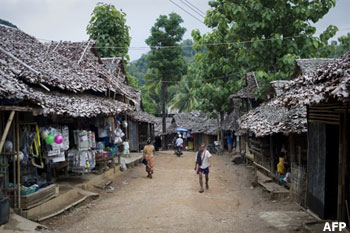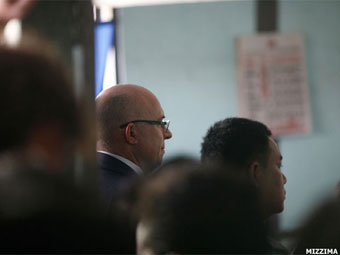No official actions or date to begin the shut-down were approved. The Thai government said plans to provide training and skills to the refugees would be part of any plan.

The Mae La refugee camp shown above is one of nine camps on the Thai-Burmese border that would be closed. Nine refugee camps are home to more than 140,000 ethnic group members from Burma, many of whom have fought the Burmese regime for up to four decades. Photo: AFP
Thai Foreign Minister Kasit Piromya and newly-appointed Burmese Foreign Minister Wunna Maung Lwin discussed the issue during a meeting on the sidelines of the Special Informal Asean Foreign Ministers' meeting in Bangkok on Monday.
Spokesman Thani Thongpakdi quoted Kasit as saying that the Thai government would take part in running the administrative work in nine camps now managed largely by foreign non-government organisations, according to the newspaper. Thani said Burma Foreign Minister Lwin said Burma was ready to take the refugees back.
Thai National Security Council Chief Thawil Pliensri said the closure of the refugee camps was discussed at the agency's meeting on Monday chaired by Prime Minister Abhisit Vejjajiva.
‘I cannot say when we will close down the camps, but we intend to do it’, he said, according to the Bangkok Post. ‘We are now in the process of discussion with the Burmese government’.
The refugee camps, located in Tak, Mae Hong Son, Kanchanaburi and Ratchaburi provinces, are filled with members of Burma’s numerous ethic groups, many of whom have been in armed conflict with successive Burmese governments for up to four decades. Living conditions in the camps, which are largely self-operated and administered by international aid groups and the Thai government, are harsh. Refugees are not allowed to work or to leave the camps in normal circumstances.
A spokesperson for the UN Relief Agency in Bangkok said it was too soon to send the refugees home, according to the newspaper.
‘We have been working very well with the Thai government and we do understand that they don't want the refugees to stay here forever’, said Kitty McKinsey.
‘But the solution is not forcing people to go back to a country that is still dangerous. What we would really like to see is that the returns are done in safety and dignity, and they absolutely have to be voluntary’
Chiang Mai (Mizzima) – The prosecutor in the case against the Australian cofounder of the Myanmar Times newspaper failed to appear for a scheduled hearing in the Kamayut Township Court in Rangoon on Monday, and the judge scheduled another hearing for April 27.

Australian journalist Ross Dunkley (with glasses), the founder and co-owner of the Myanmar Times, at his first court hearing on February 24, 2011. He appeared for a hearing on Monday, April 11, but the prosecution failed to show up. He has been charged with immigration violations and criminal assault. Photo: Mizzima
“We attended the hearing at around 12 a.m.’, said Wai Lin, a spokesman of the Myanmar Times. ‘We saw the judges.’ He said they set another hearing for 10:30 a.m. on April 27.
Dunkley is charged under the Emergency Immigration Act, in addition to criminal charges of assaulting a woman, giving her drugs and holding her against her will.
Prior to his release on bail late last month he was held in the infamous Insein Prison in Rangoon. The judge cited a heart condition as a factor in granting bail. Dunkley resumed work as the English editor of the newspaper after his release.
The case against Dunkley, who is also the publisher of the The Phnom Penh Post, has attracted worldwide interest in the media community.
His business associates in Cambodia said in an earlier statement that the alleged female victim testified in a previous hearing that she wished to withdraw her complaint that alleged she had been drugged and held against her will by Dunkley but the Burmese authorities would not allow the complaint to be withdrawn.
Originally from Perth, Australia, Dunkley was the first foreigner to enter the Burmese domestic newspaper market in 2000 when he joined forces with Sonny Shwe, the son of a close ally of then military intelligence chief and junta prime minister, Khin Nyunt. Less than a year after Khin Nyunt’s purging from the military junta, Sonny Shwe was arrested and new Burmese co-owners took over his stake in the paper.
Rangoon media observers said that Dunkley and the Myanmar Times’ new CEO, Dr. Tin Tun Oo, were involved in a business dispute at the time of his arrest. Tin Tun Oo was named the new CEO four days after Dunkley’s arrest. Dunkley retains a 49 percent ownership in the English-language newspaper.
Chiang Mai (Mizzima) – Citing reports that Burma’s military regime has obtained North Korean missile technology and nuclear programme assistance, three US Republican senators sponsored a resolution last Friday calling on President Obama’s administration to investigate the ‘growing relationship between the governments of Burma and North Korea’.
The April 8 resolution was sponsored by Indiana Republican Senator Richard Lugar, who is a ranking member of the Senate Foreign Relations Committee and one of the most senior members of his party in Washington, and was cosponsored by Republican senators Mitch McConnell and Jim Inhofe.
It called on the Obama administration to make public ‘an unclassified report as to the volume of ships and planes from North Korea visiting Burma, via China and elsewhere, in 2009, 2010, and through March 2011’.
Reports of Burmese-North Korean cooperation gained credibility last year following the Burmese exile broadcaster Democratic Voice of Burma’s special report featuring the testimony of an escaped Burmese military scientist, Major Sai Thein Win. The defector’s allegations were further strengthened by the disclosure of top secret US diplomatic cables which detailed American suspicions that Burma is working to develop both rocket and nuclear programs with the assistance of North Korea. The cables were disclosed by Wikileaks and the Guardian newspaper at the end of 2010.
Lugar’s Burma resolution calls on President Obama to ‘provide leadership by calling for an international investigation into allegations of international crimes against civilians in Burma, including ethnic minorities, by the Government of Burma’ and the release of all political prisoners.
While the US government has endorsed the idea of such an inquiry, the US State Department has not been active in encouraging other nations around the world to do so. The commission of inquiry was first proposed in March last year by Tomas Ojea Quintana, the UN special rapporteur on the human rights situation in Burma.
Burma democracy activists have complained that lack of American interest in the commission of inquiry was one of the reasons that UN Secretary-General Ban Ki Moon failed to mention the potential for an inquiry in his report on the situation of human rights in Burma issued to the UN General Assembly last September.
The Lugar resolution also noted that two years into his four year term, President Obama is still yet to appoint a Special Representative and Policy Coordinator for Burma as mandated under the 2008 JADE Act. According to recent press reports, Obama will soon appoint the current principal deputy assistant secretary of defense for Asian and Pacific affairs Derek Mitchell.
At a press conference on Friday afternoon in Washington, Michael H. Posner, Assistant Secretary of State for Democracy, Human Rights and Labor, told reporters that the Obama administration is still concerned by the situation in Burma.
Posner said that Burmese democracy activist ‘Aung San Suu Kyi is now free, but it's a limited freedom, and she doesn't have the ability or her party to operate in any sense in a way that allows her to really oppose what the government's doing’.
Posner also criticized Burma’s new military-dominated legislature saying, ‘We now have a new parliament in place, but it is not clear that it is going to make any difference in terms of opening up the space’.
